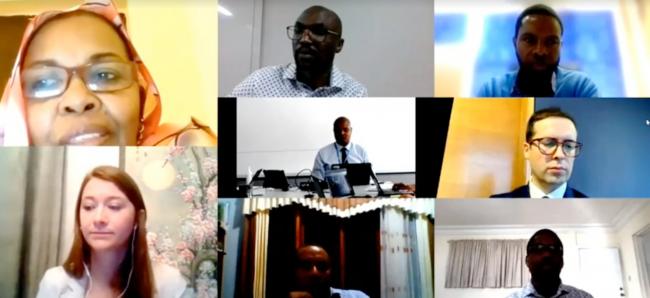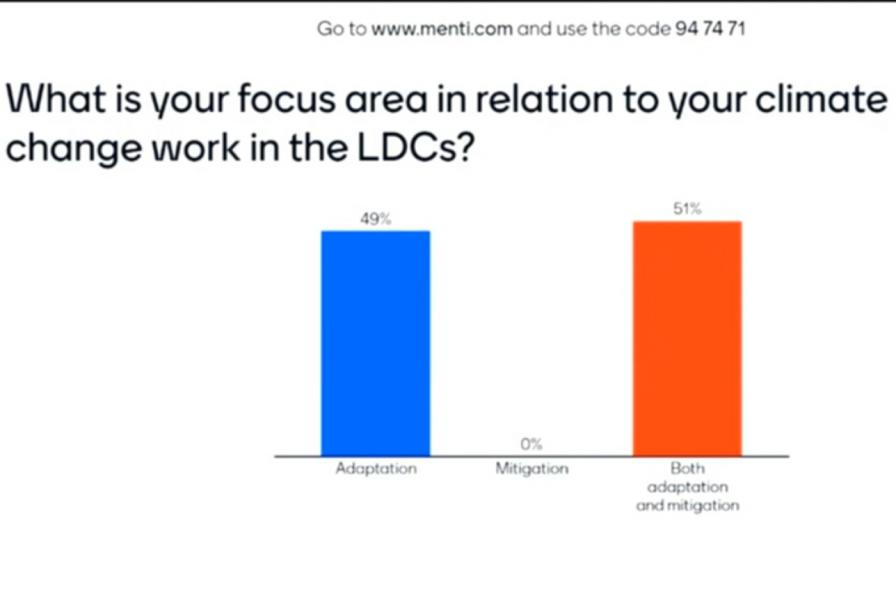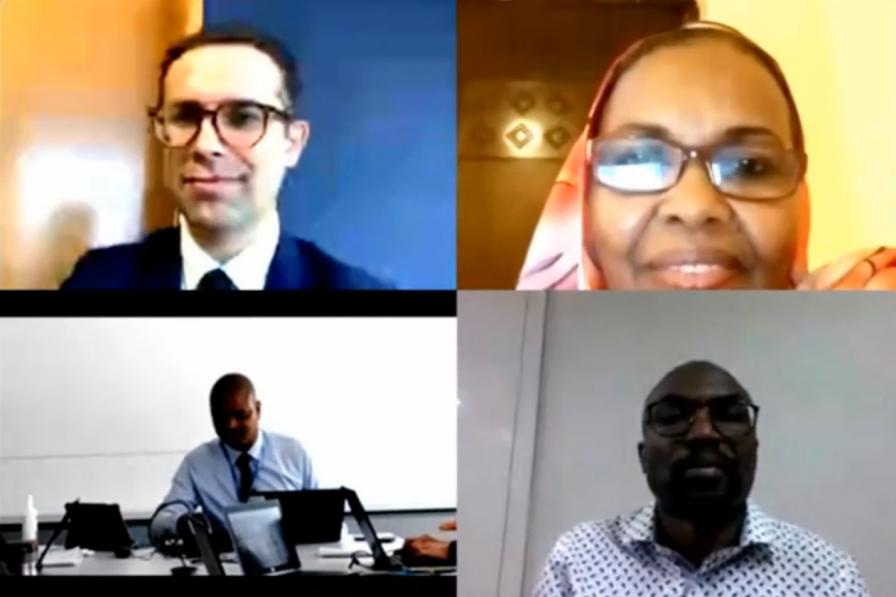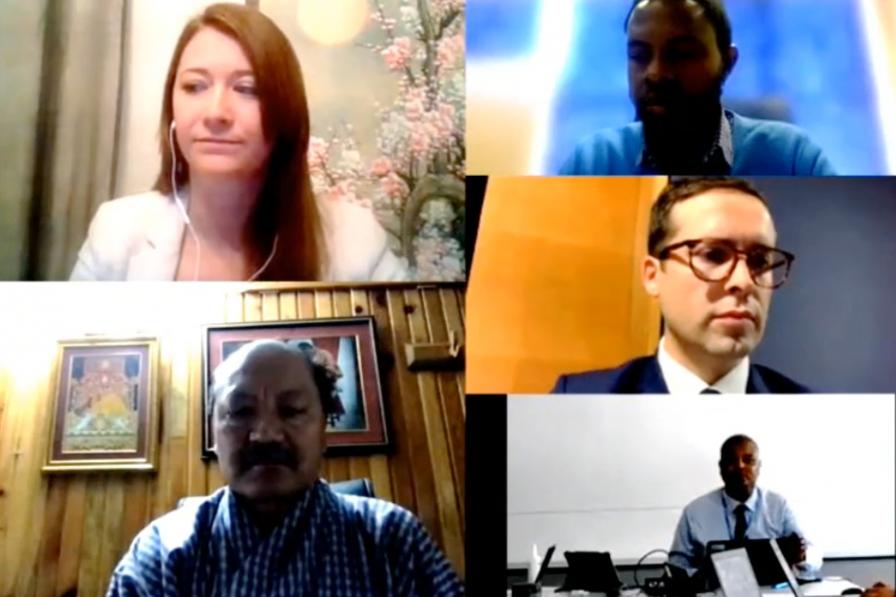The June Momentum for Climate Change, a series of virtual events organized by the UN Framework Convention on Climate Change (UNFCCC) Secretariat, continued Tuesday.
Enhancing support to the LDCs: Insights from a recent stocktaking meeting of the work of the LEG
The Least Developed Countries Expert Group (LEG) Chair Hana Hamadalla Mohamed (Sudan) moderated the event, which utilized real-time polling software to collect audience inputs for the LEG’s work, including on: COVID-19-related challenges affecting delivery of support; ensuring adaptation support continues; and strategies for minimizing delays in national-level activities.
Citing multiple shocks affecting the LDCs and insufficient climate responses globally, LDC Group Chair Sonam Phuntsho Wangdi (Bhutan) called for whole-of-society approaches that reach the local level and help build in-country institutional capabilities. He highlighted the LDC 2050 Vision, which aims to achieve climate-resilient development pathways by 2030 and net-zero emissions by 2050, and lamented that LDCs are currently receiving 0.6% of the USD 97 billion needed to finance climate plans.
Opportunities and challenges in enhancing delivery of support to the LDCs
Nikki Lulham, LEG Member (Canada), presented highlights from a LEG stocktaking meeting held in Antananarivo, Madagascar, from 10-12 February 2020, noting increasing availability of technical support.
Pa Ousman Jarju, Green Climate Fund (GCF) Secretariat, and Chizuru Aoki, Global Environment Facility (GEF) Secretariat, presented on support to LDCs for the formulation and implementation of national adaptation plans (NAPs). Jarju noted the GCF can send experts to LDCs to support NAP development, and highlighted support available for turning project ideas into concept notes and funding proposals. He reported on the approval of 32 LDC adaptation planning proposals.
Aoki, in a recorded presentation, reported on the approval of 34 projects during the first two years of the GEF-7 Replenishment, and noted that LDCs are highly vulnerable to COVID-19 and require targeted efforts.
Emerging gaps and needs related to implementing the Convention and the Paris Agreement in the LDCs, including those emerging from the COVID19 outbreak
Adao Soares Barbosa (Timor-Leste) detailed how lockdowns, border closures, and social distancing requirements have affected Timor-Leste’s NAP preparations, noting plans to hold virtual discussions to finalize its initial NAP submission.
Mokoena France (Lesotho) cited challenges caused by home-based work to progress on the country’s NAP, including lack of internet access and necessary tools, and suggested fast-tracking support to enable implementation of the NAP in early 2021. He also identified the need for support to access virtual meeting tools to enable transition into a virtual working mode.
Modalities for delivering support to the LDCs
Kenel Delusca, LEG Vice-Chair (Haiti), shared updates on the LEG’s technical support work, including the multi-stakeholder collaboration-based Open NAPs initiative and workshops to develop project proposals and access funding. He reported that some LDCs are on track to publish their NAPs in 2020.
Manuel José Salidas, Presidency, 25th session of the Conference of the Parties (COP 25), commended the LEG’s role in supporting the formulation of NAPs, National Adaptation Programmes of Action (NAPAs), and the LDC Work Programme.
Archie Young, incoming COP 26 Presidency, said the pandemic has thrown a stark light on the importance of building resilience, and stressed international solidarity to support the LDCs and implement the Paris Agreement and the Sustainable Development Goals (SDGs). He noted the UK’s support to the LDC Initiative for Effective Adaptation and Resilience (LIFE-AR) launched at COP 25, and underscored that ambition goes beyond reducing emissions and includes scaling up means of implementation, protecting natural ecosystems, building adaptation, and minimizing loss and damage.
Audience questions focused on, inter alia, ensuring that GCF funding builds capacity at the local level, support to LDCs coping with COVID-19, and short-term support for continued work on NAPs. Panelists suggested adopting Nepal’s example of developing local adaptation plans, alongside NAPs, and integrating local-level initiatives into the NAP process.
In closing, LEG Chair Mohamed noted LDCs’ increased support needs due to COVID-19, calling for new ways of thinking and scaling up available financial and technical support, and maximizing synergies implicit in the COVID-19 recovery.
Selected Photos
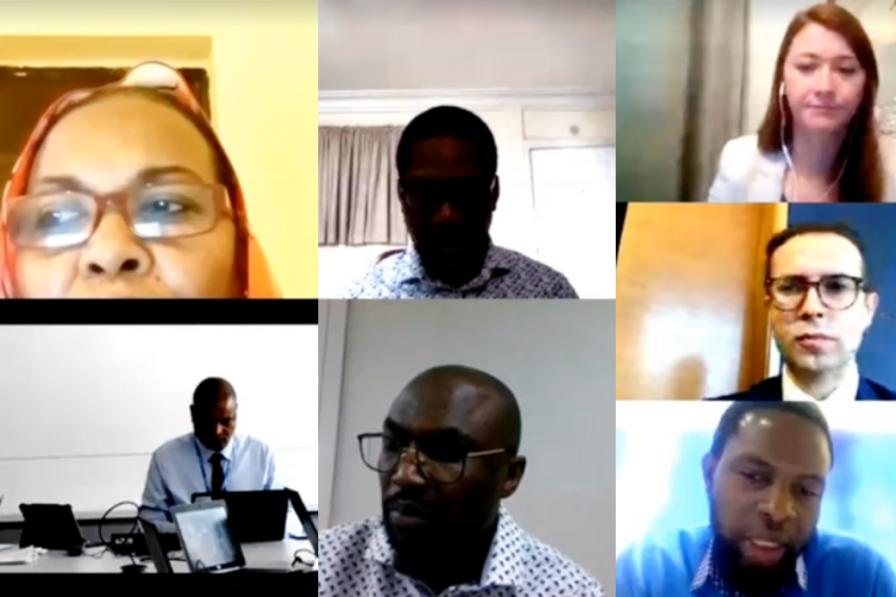
Clockwise from top left: Least Developed Countries Expert Group (LEG) Chair Hana Hamadalla Mohamed, Sudan; Kenel Delusca, LEG Vice-Chair, Haiti; Nikki Lulham, LEG Member, Canada; Manuel José Salidas, COP 25 Presidency; Mokoena France, Lesotho; Pa Ousman Jarju, Green Climate Fund (GCF) Secretariat; UNFCCC Secretariat IT support.
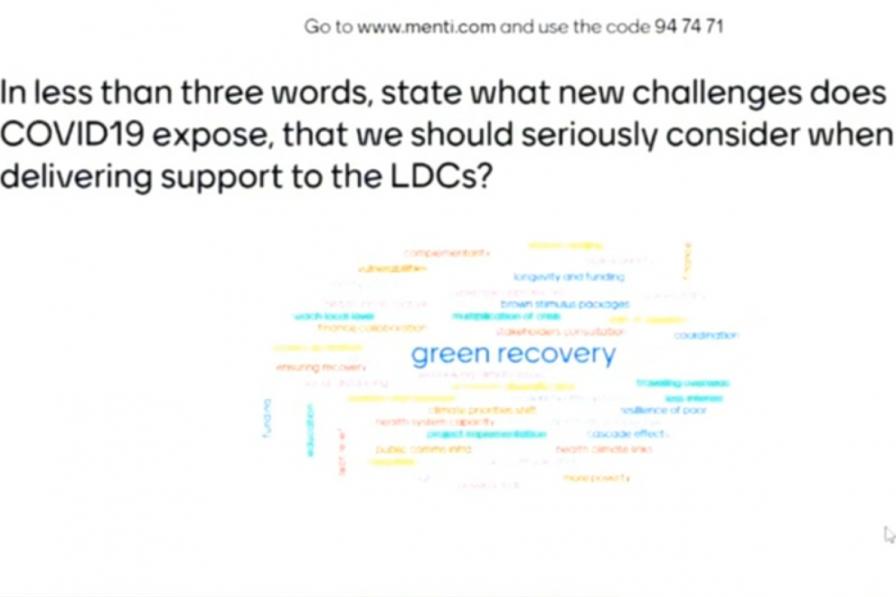
Audience shares their brief inputs on COVID-19-related challenges to prioritize in delivering support to the LDCs, with green recovery showing popularity among 46 respondents.
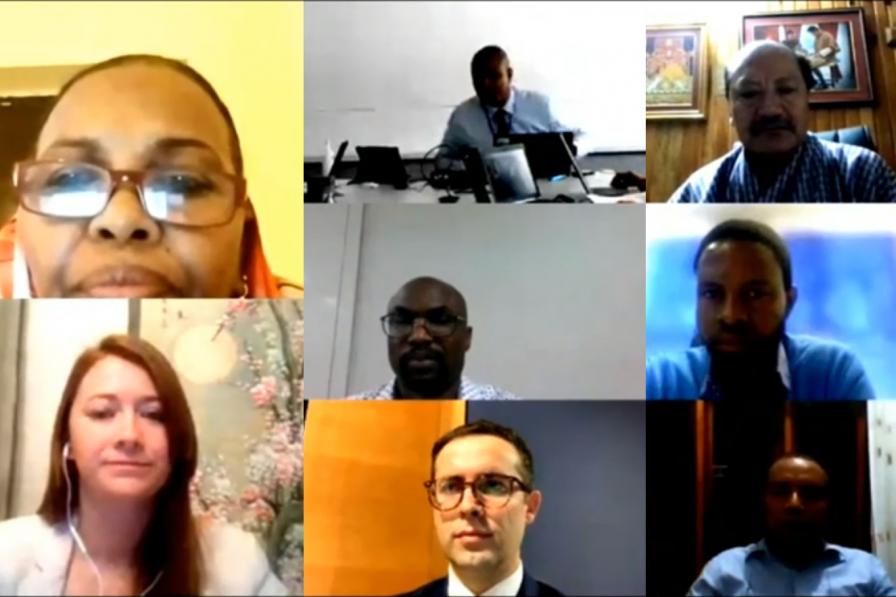
Clockwise from top left: Least Developed Countries Expert Group (LEG) Chair Hana Hamadalla Mohamed, Sudan; UNFCCC Secretariat IT support; LDC Group Chair Sonam Phuntsho Wangdi, Bhutan; Mokoena France, Lesotho; Adao Soares Barbosa, Timor-Leste; Manuel José Salidas, COP 25 Presidency; Nikki Lulham, LEG Member, Canada; Pa Ousman Jarju, Green Climate Fund (GCF) Secretariat (middle).
